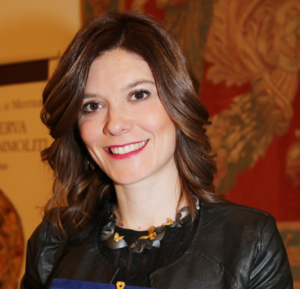
Amanda hopes her cancer journey is a positive example for her kids
April 22, 2024
This is a guest post by Amanda Reitz, a mother of three children who were 13, 9, and 5 years…
Read More
Dr. Chiara Di Malta is a postdoctoral fellow at the Telethon Institute of Genetics and Medicine in Pozzuoli, Italy.
She received a 2020 Young Investigator Award for her project, called “Exploiting the potential of MiT/TFE factors inhibition to treat inherited kidney cancers”, which focuses on two types of genetic renal cell carcinomas.
We spoke to Dr. Di Malta about her work and what it means for people with kidney cancer.
Dr. Di Malta: There are several genes that, when mutated, are associated with an increased risk of developing kidney cancer, in particular renal cell carcinoma (RCC). Birt-Hogg-Dube (BHD) syndrome is a rare disorder due to mutations in the gene encoding folliculin (FLCN) and associated with increased risk of developing RCC with a mean age of onset of 50 years, although patients as young as 20 years old have been reported.
These tumors are malignant and can metastasize and surgery is currently the only available therapy, there are no approved therapeutic options. Unfortunately, BHD patients are at risk to develop multiple tumors and may undergo repeated surgeries during their lifetime.
A different, but somehow related, genetic condition causing RCC is due to mutation in the genes encoding TFE3 or TFEB, members of the MiT/TFE [microphthalmia/transcription factor E] family of transcription factors. This is causing translocation RCC (tRCC), an aggressive tumor responsible for up to 50 % of all pediatric RCC cases. Also in this case, surgery is the treatment of choice when possible but for patients with metastases there are no effective therapies available.
Dr. Di Malta: tRCC is due to mutations in MiT/TFE genes, resulting in increased levels of these transcription factors. As MiT/TFE factors are the cause of kidney cancer in this genetic condition, their inhibition represents obviously the best option for an effective, targeted therapy. Our recent research work also suggests that MiT/TFE factors are the main cause of kidney cancer development in BHD patients. Therefore, the inhibition of MiT/TFE factors would represent a valuable, effective therapeutic strategy for the treatment of both these genetic types of kidney cancer.
Dr. Di Malta: I have worked on MiT/TFE factors for many years. Some time ago, by studying tRCC, I discovered the main oncogenic mechanism driving tumor development in this genetic condition. Increased levels of MiT/TFE factors, due to genetic mutations, cause the excessive activation of a pathway important for cell growth and proliferation, thus promoting tumor formation. Subsequently, by studying the kidney tumors associated with BHD syndrome, which is due to mutations in the gene encoding folliculin, I noticed that these tumors are characterized by activation of the same oncogenic pathway. At that point, I asked myself whether MiT/TFE factors could be implicated also in this different type of genetic kidney cancer. By exploiting cellular and murine models of BHD syndrome, I found indeed that MiT/TFE factors are too active when FLCN is mutated and genetic inactivation of one specific member of their family, TFEB, fully prevented tumor establishment in a BHD mouse model. Therefore, I understood that pharmacological inhibition of MiT/TFE factors could represent a candidate therapeutic approach for the treatment of both tRCC- and BHD-dependent RCC.
Dr. Di Malta: Up to now, no effective therapies exist to treat kidney cancer due to genetic mutations of MiT/TFE factors (tRCC) or due to FLCN mutations (BHD syndrome). This project has the potential to provide a foundation for the development of an effective targeted therapy to inhibit kidney cancer development in both genetic conditions. This would be extremely valuable for patients affected by these genetic conditions since it could radically improve their quality of life as well as their life expectancy.
Dr. Di Malta: First, curiosity! Curiosity fosters my learning attitude for its own sake. I love to understand how biological processes work and I feel really excited when I make a new discovery that can move forward scientific knowledge. However, my interest in cancer biology came from my family history, since both my parents died of cancer. Therefore, few years ago, I decided to exploit my background in genetics to study inherited cancer, in particular kidney cancer, with the purpose to put my love for science at the service of patients asking for a cure.